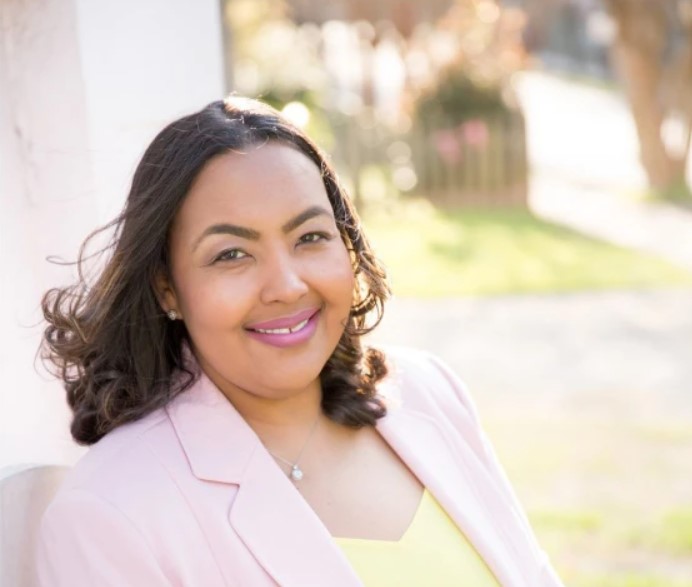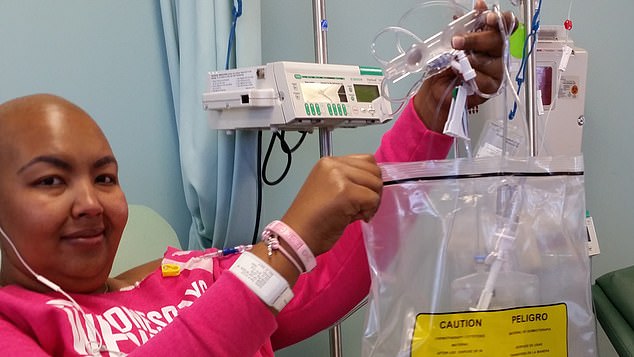
When Tiah Tomlin-Harris got diagnosed with breast cancer at the age of 38, she had no family history of the disease. However, she believed one key component may have led to her diagnosis: her lifestyle.
Convinced that this was the case, Tomlin-Haris asked a social worker at the hospital if there was anything she should be doing to prevent her cancer from worsening or coming back after remission. Tomlin-Harris, who has a master's in chemistry and worked in the pharmaceutical industry, read about chemicals in beauty products being linked to cancer risk. However, the social worker wasn't so convinced that the beauty products were the culprit. In fact, the social worker told Tomlin-Harris to continue using them because there was nothing she could do. Lifestyle changes don't work.
Despite this, Tomlin-Harris still felt strongly about the harmful chemicals and toxins often found in common beauty products so she set out on a mission to educate Black women and ensure that they had better information than she did.
“Since the diagnosis, I’ve been busy helping other men and women fight, Tomlin-Harris said, according to a blog post. “I started a Facebook group called My Breast Years Ahead – Atlanta, helping women who have been affected by any type of cancer in the Atlanta area, connect and share their journey.”
In 2019, she joined Bench to Community, a research initiative in California dedicated to informing Black women about the harmful chemicals found in beauty products. The team is currently conducting research into how chemicals in beauty products may uniquely affect Black women.
Tomlin-Harris also co-founded My Style Matters, a 501c grassroots nonprofit organization dedicated to educating and supporting underserved families impacted by cancer.
"There are beauty supply stores everywhere in our community, on every corner," Tomlin-Harris told Insider. "Beauty supply stores have harmful chemicals in them. So how do we get this messaging out into the community?"
This information is vital because research on chemicals in personal-care products and breast cancer is still lacking, according to the American Cancer Society. When research is conducted, they mainly consist of white participants, leaving Black women left out of crucial clinical trials.
"The people who conduct these studies are also not people of color," says Lindsey S. Treviño, an assistant professor at City of Hope and a researcher with Bench to Community. "You study what you're interested in, or what you care about, in the laboratory."
Recent studies have shown that parabens (preservatives found in beauty, hair, shaving, and makeup products) and phthalates, which are often used in nail polish and hairspray, may be linked to cancer.
RELATED: New Study Finds Link Between Black Hair Products and Breast Cancer
Why do beauty products pose a risk for Black women?
Let's face it, as Black women, we spend more money on beauty and hair products than other demographics. One reason we tend to spend more than our white counterparts stems from the discrimination we face when wearing our natural hair in white-dominated workplaces, Dede Teteh, a behavioral scientist and assistant professor of public health at Chapman University notes. The unfortunate news, though, is that many of the products that are marketed toward us contain parabens and phthalates, according to Nielsen data.
Researchers at the City of Hope recently found that parabens uniquely increase the growth of breast cancer cells in Black women compared to white women.

This news is alarming because Black women under 45 are already more likely to get breast cancer compared to white women and die from the disease. In fact, as of 2019, breast cancer is the leading cause of cancer mortality among Black women.
This is why the work that Teteh, Tomlin-Harris and the Bench to Community team of eight researchers and community advisors is so important.
The team shares up-to-date research with the Southern California community in the form of salon conversations and symposiums, including an upcoming one in September. Over the past few years, Bench to Community has lobbied in support of a suite of four federal bills that would ban beauty companies from using parabens and phthalates.
Teteh has one final message for women tired of fighting racial discrimination and having to make lifestyle changes:
"If the message that I can get across to other Black women that are reading this article, it would simply just be: 'I get it. I know you're tired,'" Teteh told Insider. "It's sh***y that we have to live in a society that does not protect us. But at the same time, if we continue to show up as ourselves and we are comfortable in our skin, I think that's good enough."
In the meantime, when picking beauty products, remember to take a close look at the ingredients. If they contain parabens and phthalates, it is best to steer clear of them no matter what wonders they may do for your hair, skin, nails, etc. Although smelling good is the goal, it is also wise to choose fragrance-free products because many fragrance chemicals have been linked to cancer, birth defects, hormone disruption, and other chronic health problems.
For more information on which products contain harmful ingredients, click here.









